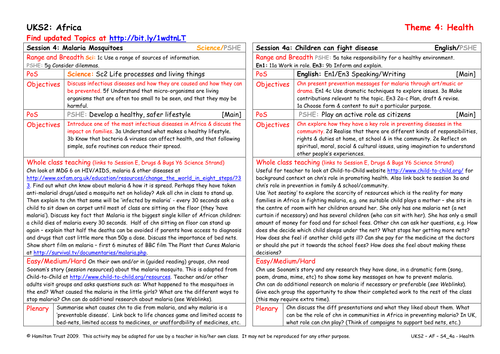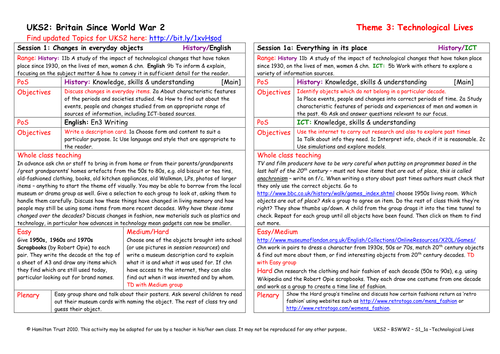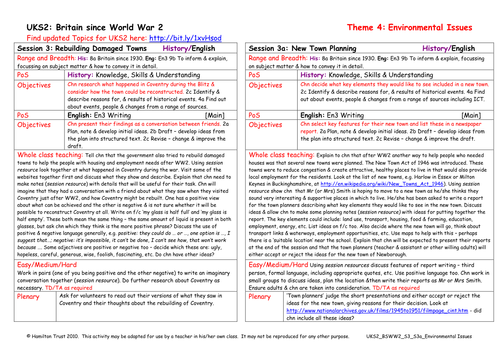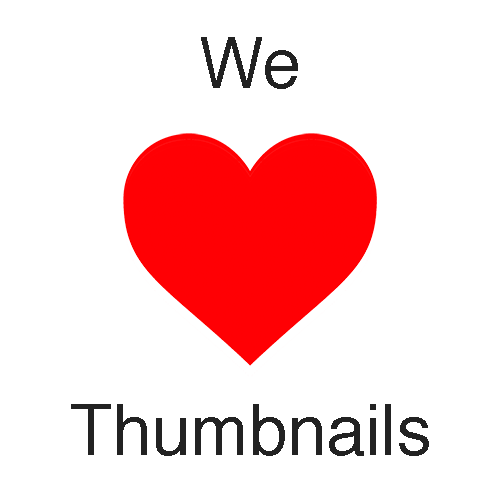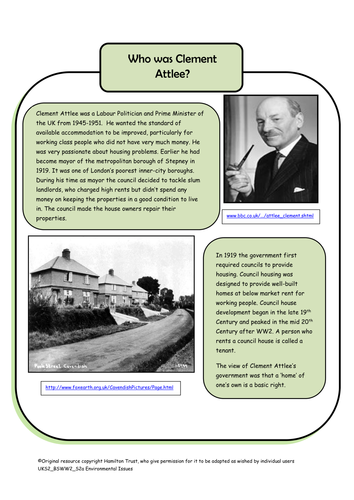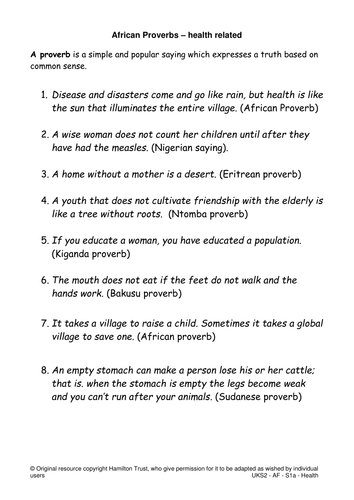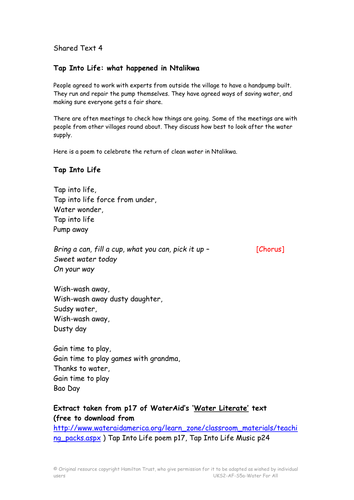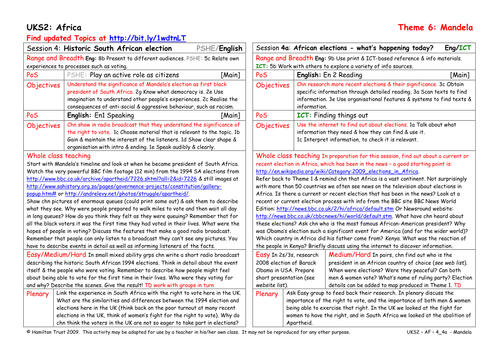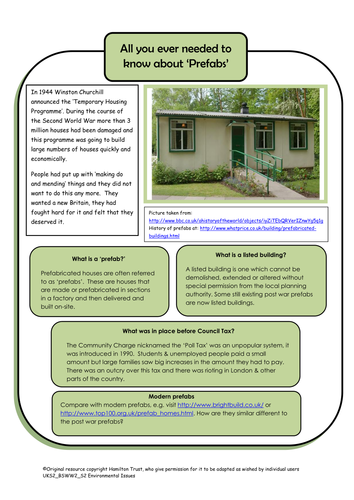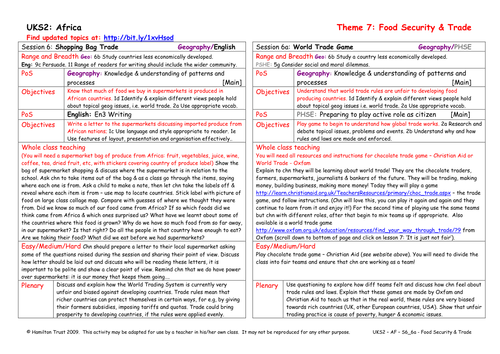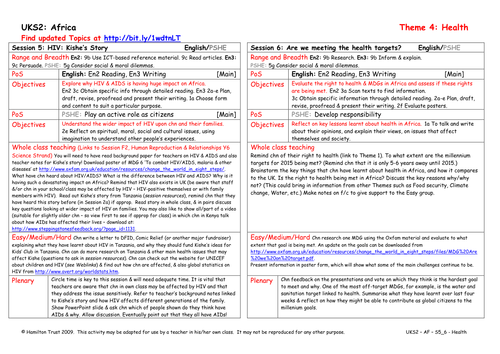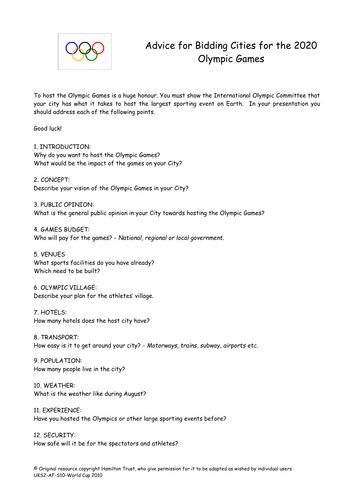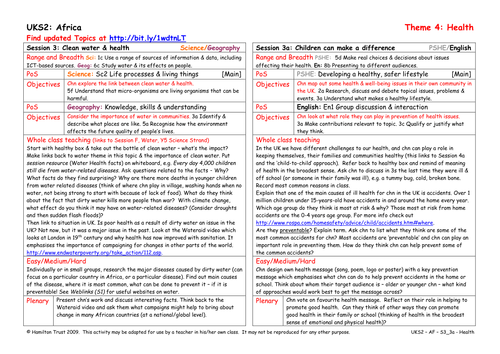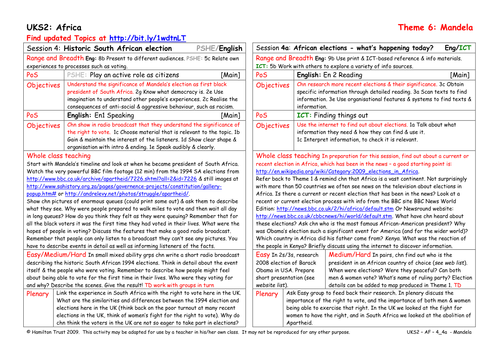
397Uploads
10041k+Views
11644k+Downloads
English language arts

Children Can Fight Diseases
Children present through poetry, role play, song or dance, an action that can be taken to prevent malaria.
Suitable for years 5 and 6.

Changes In Everyday Objects
Children look at every day objects which have changed since WW2, choose one and write a museum card for it.

Effects of Human Land Use
Children read the description of a fictional tourist town, they consider the way the town is dependent upon the tourist industry that surrounds the Coral Lake.
A proposed new bylaw aims to change things – what effects will this have? Children hold a town meeting.

Making A Link
Discuss the reasons why linking with a school in Africa is important & emphasise its importance in helping to fulfil the Millennium Development Goals. Chn tackle a CAFOD activity to act as advisers to an aid agency distributing funds to suitable projects.
Suitable for years 5 and 6.

Rebuilding Damaged Towns
After WW2 many towns that were badly damaged in the bombing needed to be re-built. Children research what happened in Coventry and consider what could be done to help re-build and re-construct the area. Present their findings as a conversation between friends.

School Structure
Compare your school with your link school (or use a Ghanaian school). The UNICEF book 'A school like mine' is used as a starting point to look at similarities and differences. Children prepare a website describing their school or the UK education system.
Suitable for years 5 and 6.

Council Houses
Children recognise the need for affordable social housing. Groups discuss different forms of affordable housing – council houses, tower blocks, housing associations, prefabs.
Feedback to class with pros and cons and decide which would be most useful after a problem.

Healthy Proverbs
Discuss African proverbs about health and their meanings. Children design their own posters or prepare a drama /freeze frame to show meaning of healthy proverb. Compare to healthy proverbs/sayings in the UK?
Suitable for years 5 and 6.

Tap Into Life
Time to celebrate water! Children use the Oxfam online water photo-montage and Water Literate’s ‘Tap Into Life’ poem set to their provided music, to both prepare a performance and write their own celebratory poems with percussive backgrounds.
Suitable for years 5 and 6.

African Elections
Africa is a large continent with over 50 countries – usually there is an election going on somewhere! Children research a current/recent election in Africa and/or the election of Barack Obama as President of USA. Discuss the significance of Obama’s election.
Suitable for years 5 and 6.

Prefabs
Children understand that millions of houses were destroyed during WW2 and they needed to be replaced. Houses were designed that were pre-fabricated. They were quick to build; thousands were put up in the 1940s/1950s. Children choose key info needed to sell a prefab.

Shopping Bag Trade
Children learn how much of the food we buy in supermarkets is produced in African countries. They discuss this in the light of their knowledge of fair trade and write a letter to the local supermarket to discuss the issues.

Are we meeting the health targets?
Reflect back on ‘Right to health and MDGs. Investigate how far children think their rights and the MDGs related to health are being met. Present a MDG in an interesting way.
Suitable for years 5 and 6.

Olympic Games: an African Aim
The host of the 2020 Olympic games will be …? The groups present their Olympic bids before the winner is announced. The real decision won’t be made until 2011, but will Africa be awarded the games for the first time?

Mini World Cup
Is your school ready for kick off? In this session you help the children plan a mini world cup for your school. How can you get other children involved? Who will take responsibility for each aspect of the mini tournament?

Building a Sporting Future for Africa
In this session children take a look at successful Olympic bids from London and Rio before starting to put together their own 2020 bid on behalf of one of the World Cup host cities.

Children can make a difference
Children research what are key health issues for their own class. Focus on accidents and how they can be prevented. Understand concept of preventable and how children can play an important role in prevention
Suitable for years 5 and 6.

Historic South African election
Black Africans were very eager to vote in the 1994 South African election. Discuss the significance of Mandela’s election as the first black president in South Africa. Use historic film footage to show queues of voters and reactions to the election.
Suitable for years 5 and 6.

Devices to build cohesion - Presentation & Exercises
Grammar teaching presentation and grammar exercises.
The teaching presentation includes 22 slides that cover:
Devices to build cohesion within and across paragraphs.
Pronouns
Determiners
Subordinating Conjunctions
Adverbs
Paragraphs
Adverbials (including place, number, time)
Topic Sentences
Each cohesive device is introduced, clearly explained, and an example is provided. The class is asked some simple questions to check understanding.
We then provide grammar exercises for children to:
Practise using conjunctions correctly
Practise using cohesive devices within a paragraph
Each collection of exercises is made up of three sets. Set A is the easiest or most accessible, Set C is the hardest or uses more complex language.
This resource is aimed at UKS2. Use the presentation to introduce or revise a grammatical concept as a stand-alone lesson or add on the accompanying exercises for children to practise and apply their knowledge.

Adverbials - Presentation & Exercises
Grammar teaching presentation and grammar exercises.
The cat themed teaching presentation includes 22 slides.
Revise verbs and then look at:
Adverbials
Prepositions
Fronted adverbials
How to punctuate fronted adverbials
How to use more than one adverbial in a sentence
Clear examples are provided throughout.
We then provide grammar exercises for children to:
Identify adverbials in a passage
Add adverbials to a sentence
Each collection of exercises is made up of three sets. Set A is the easiest or most accessible, Set C is the hardest or uses more complex language.
This resource is aimed at UKS2. Use the presentation to introduce or revise a grammatical concept as a stand-alone lesson or add on the accompanying exercises for children to practise and apply their knowledge.

